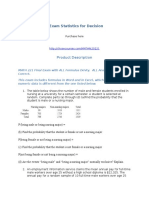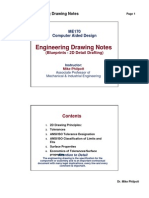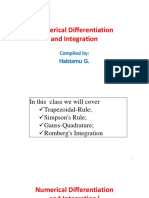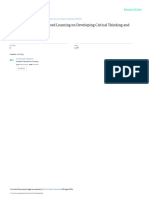Course Outline DBM 1033 Mathematical Computing
Uploaded by
Faizal Akhtar AzharCourse Outline DBM 1033 Mathematical Computing
Uploaded by
Faizal Akhtar AzharCOURSE INFORMATION OUTLINE
CODE & COURSE : DBM1033 – MATHEMATICAL COMPUTING (DDT 1B)
PRE-REQUISITE(S) : NONE
LECTURER : NORAFIZA AKMA BINTI SHAMSUDIN
DEPARTMENT : MATHEMATICS, SCIENCE AND COMPUTER DEPARTMENT
DELIVERY METHOD : THEORY & TUTORIAL
CREDIT HOURS :3 TOTAL LECTURE HOURS : 26
TOTAL TUTORIAL HOURS : 23
TOTAL OTHERS HOURS :7
PROGRAMME LEARNING OUTCOMES (PLO)
Upon completion of this programme, graduates will be able to:
1. Apply the foundation of computing, mathematics and soft skills to be competent and possess strong understanding in related Information
Technology (IT) fields;
2. Practice technical skills by applying appropriate methodologies, models and techniques in IT fields
3. Communicate effectively with IT professionals, other professionals and community;
4. Demonstrate strong analytical and critical thinking skills to troubleshoot and solve problems within realistic constraints by applying knowledge,
principles and skills in IT;
5. Demonstrate an awareness of and consideration for society, health, safety, legal and cultural issues and their consequent responsibilities;
6. Acquire life-long learning and professional development to enrich knowledge and competencies;
7. Inculcate entrepreneurial skills in the related discipline that contributes towards national growth and be competitive in IT industries;
8. Adhere to professional codes of ethics and enhance humanistic values to adapt to the real challenges in working environment; and
9. Demonstrate effective leadership and teamwork skills.
SYNOPSIS
MATHEMATICAL COMPUTING course introduces students to numbering system, geometry and complex numbers. Calculus covers the simple techniques of
differentiation and integration. In addition, this course also exposed to basic concept of matrices and linear algebra to help them in solving mathematical
problem in organizing data through theoretically and practically.
COURSE LEARNING OUTCOMES
Upon completion of this course, students should be able to:
1. Apply mathematical concepts in the areas of number systems, complex numbers, matrices, linear algebra, geometry, and differentiation & integration. (C3,
PLO1)
2. Find mathematical solutions using the appropriate techniques in mathematics. (C3, A3, PLO1, PLO4)
3. Solve related mathematical problems using appropriate formulae and laws. (C4, A3, PLO1, PLO4)
IMPLEMENTATION
NO. PARTICULARS RTA CLO COURSE WORK REMARKS
WEEK
NUMBERING SYSTEM 1
This topic introduces the numbering systems:
TUTORIAL TASK 1
1 decimal, binary, octal and hexadecimal. The topic 04 : 03 : 01 CLO 1
QUIZ 1
covers the conversion between numbering systems,
binary arithmetic. 2
GEOMETRY
This topic deals with identifying the different types of 3
angles, the properties of angles in a circle and
CLO 1
2 tangent to a circle. This topic also covers the use of 04 : 03 :01 ASSIGNMENT
CLO 2
the Pythagorean Theorem to calculate the perimeter,
area and volume of two and three dimensional 4
geometric objects.
COMPLEX NUMBERS
This topic describes the differentiation between the 5
TUTORIAL TASK 2
real, imaginary and complex numbers as well as the CLO 1
3 04 : 03 : 01 QUIZ 2
operations of complex numbers. Complex numbers CLO 2
TEST
uses the Argand’s Diagram to find the modulus and 6
argument.
7
DIFFERENTIATION & INTEGRATION
TUTORIAL TASK 3
This topic covers the techniques of differentiations as 8
CLO 2 TUTORIAL TASK 4
4 well as to find the tangent and normal equations. It 08 : 06 : 04
CLO 3 QUIZ 3 9
also discusses on integral formulas and techniques of
TEST
integrations, indefinite integrals and definite integrals.
10
11
MATRICES AND LINEAR ALGEBRA
12
This topic deals with basic operations performed on QUIZ 4
5 08 : 03 : 03 CLO 3
matrices. It also covers the simultaneous linear TUTORIAL TASK 5
13
equations by using matrices method.
14
DBM1033 – MATHEMATICAL COMPUTING Page 1 of 2
TYPES OF ASSESSMENT:
The course assessment is carried out in two sections:
i. COURSEWORK (CA) – 60 %
Coursework assessment that measures knowledge, practical skills and generic skills are carried out in the form of
continuous assessment. Coursework assessments total score comprises the knowledge and practical marks ONLY.
It does not include the mark of generic skills.
Coursework is carried out throughout the semester and comprises the following:
a. Test (minimum 1) 15 %
b. Quiz (minimum 4) 10 %
c. Tutorial Task (minimum 5) 15 %
d. Assignment (minimum 1) 20%
[All Assessment Tasks above to be executed during Lecture/ Practical/ Tutorial hour]
ii. FINAL EXAMINATION ASSESSMENT (FE) – 40 %
Final examination is carried out at the end of the semester.
REFERENCES:
Main:
Abdul Hadi Yaakub, Ong Beng Sim et al, (2012). Mathematics for Matriculation Semester 2: Fourth edition
update. Kuala Lumpur: Fajar Bakti. (ISBN: 978-9834504076).
Hanrahan, V. (2013). OCR Additional Mathematics Practice Book. London: Hodder Education. (ISBN: 978-
1444189506)
Additional:
Huettenmueller, R. (2012). Pre-Calculus Demystified 2/E (2nd Edition). USA: McGraw-Hill Professional. (ISBN: 978-
0071778497)
O’Regan, G. (2012). Mathematics in Computing: An Accessible Guide to Historical, Foundation and
Application Contexts. New York: Springer (ISBN: 978-1447145332)
Vince, J. A. (2010). Mathematics for Computer Graphics (Undergraduate Topics in Computer Science). New
York: Springer. (ISBN: 978-1-84996-022-9)
RULES:
1. Attendance is compulsory for every student. Students are required to have at least 80% attendance.
2. Punctuality is essential. Every student is required to be in the lecture hall/lecture room/ workshop 5
minutes before class starts.
3. Student should submit all coursework on time.
4. All students must take part in every exercise/ task in class. Plagiarism and cheating will be severely
dealt with.
5. Students should conduct themselves in an appropriate manner following the policies and guidelines
of the polytechnic.
Prepared by: Approved by:
…………………………….. …………………………………………
(NORAFIZA AKMA BINTI SHAMSUDIN) ( )
I HEREBY ACKNOWLEDGE THAT I HAVE RECEIVED AND READ THE COURSE INFORMATION OUTLINE AND
WILL COMPLY WITH THE RULES STATED.
………………………………..
Name :
Student registration no. :
Date :
DBM1033 – MATHEMATICAL COMPUTING Page 2 of 2
You might also like
- Hourglass Workout Program by Luisagiuliet 276% (21)Hourglass Workout Program by Luisagiuliet 251 pages
- The Hold Me Tight Workbook - Dr. Sue Johnson100% (16)The Hold Me Tight Workbook - Dr. Sue Johnson187 pages
- Read People Like A Book by Patrick King-Edited62% (66)Read People Like A Book by Patrick King-Edited12 pages
- Livingood, Blake - Livingood Daily Your 21-Day Guide To Experience Real Health77% (13)Livingood, Blake - Livingood Daily Your 21-Day Guide To Experience Real Health260 pages
- COSMIC CONSCIOUSNESS OF HUMANITY - PROBLEMS OF NEW COSMOGONY (V.P.Kaznacheev,. Л. V. Trofimov.)94% (212)COSMIC CONSCIOUSNESS OF HUMANITY - PROBLEMS OF NEW COSMOGONY (V.P.Kaznacheev,. Л. V. Trofimov.)212 pages
- Donald Trump & Jeffrey Epstein Rape Lawsuit and Affidavits83% (1016)Donald Trump & Jeffrey Epstein Rape Lawsuit and Affidavits13 pages
- The 36 Questions That Lead To Love - The New York Times94% (34)The 36 Questions That Lead To Love - The New York Times3 pages
- The 36 Questions That Lead To Love - The New York Times95% (21)The 36 Questions That Lead To Love - The New York Times3 pages
- Jeffrey Epstein39s Little Black Book Unredacted PDF75% (12)Jeffrey Epstein39s Little Black Book Unredacted PDF95 pages
- The 4 Hour Workweek, Expanded and Updated by Timothy Ferriss - Excerpt23% (954)The 4 Hour Workweek, Expanded and Updated by Timothy Ferriss - Excerpt38 pages
- EducationFreedomScholarships Amd - SB2787No ratings yetEducationFreedomScholarships Amd - SB27877 pages
- MATH 221 Final Exam Statistics For DecisionNo ratings yetMATH 221 Final Exam Statistics For Decision8 pages
- Self-Learning Module For Grade 11: Chapter Iv: Estimation of ParametersNo ratings yetSelf-Learning Module For Grade 11: Chapter Iv: Estimation of Parameters88 pages
- Las Individualidades Espirituales de Los Planetas PDFNo ratings yetLas Individualidades Espirituales de Los Planetas PDF15 pages
- Engineering Properties of Soils and Materials PermeabilityNo ratings yetEngineering Properties of Soils and Materials Permeability8 pages
- Engineering Drawing Notes: ME170 Computer Aided Design100% (1)Engineering Drawing Notes: ME170 Computer Aided Design41 pages
- Rev Syllabus in Differential Equations 1stsem AY2324No ratings yetRev Syllabus in Differential Equations 1stsem AY23248 pages
- 5 Numerical Differentiation and Integration Newton Cotes IntegrationNo ratings yet5 Numerical Differentiation and Integration Newton Cotes Integration45 pages
- WEEK 6 Numerical Differentiation and Integration For Chem EngNo ratings yetWEEK 6 Numerical Differentiation and Integration For Chem Eng111 pages
- Module #1 - Simple Stress: Engr. Lito I. MauroNo ratings yetModule #1 - Simple Stress: Engr. Lito I. Mauro38 pages
- MODULE OF INSTRUCTION - : NSCI-6100 Physics For Engineers 1No ratings yetMODULE OF INSTRUCTION - : NSCI-6100 Physics For Engineers 17 pages
- DX X F: 1 - Math 27 Preparatory Module Ii - Imsp, UplbNo ratings yetDX X F: 1 - Math 27 Preparatory Module Ii - Imsp, Uplb8 pages
- ch11 Analysis of Variance and Design of ExperimentNo ratings yetch11 Analysis of Variance and Design of Experiment54 pages
- Introduction, Basic Concept & Properties of Fluid: ENM3218/ENS6100: Fluid MechanicsNo ratings yetIntroduction, Basic Concept & Properties of Fluid: ENM3218/ENS6100: Fluid Mechanics38 pages
- Principal Stresses (Civil Engg. For AUST EEE 1/1)No ratings yetPrincipal Stresses (Civil Engg. For AUST EEE 1/1)25 pages
- Dimensioning Objectives: A. Technique of DimensioningNo ratings yetDimensioning Objectives: A. Technique of Dimensioning22 pages
- Math12 - L3 (Solutions of Right Triangles)No ratings yetMath12 - L3 (Solutions of Right Triangles)12 pages
- EngineeringMechanics StaticsLectureNotesNo ratings yetEngineeringMechanics StaticsLectureNotes167 pages
- 67b56af0879b0CalculusandAnalyticGeometeryNo ratings yet67b56af0879b0CalculusandAnalyticGeometery4 pages
- Revised C 20 Engg Maths PMS From The Academic Year 2024 25No ratings yetRevised C 20 Engg Maths PMS From The Academic Year 2024 2534 pages
- Instructions:: 1 9 2 10 3 11 4 12 5 13 6 14 7 15 8 TotalNo ratings yetInstructions:: 1 9 2 10 3 11 4 12 5 13 6 14 7 15 8 Total14 pages
- Medical Consultant Interview Question by ISC Medical Leaders in Medical IntervNo ratings yetMedical Consultant Interview Question by ISC Medical Leaders in Medical Interv33 pages
- Report of Assessment Registered Disabled Persons by The District Assessment BoardNo ratings yetReport of Assessment Registered Disabled Persons by The District Assessment Board7 pages
- Consumer Analytics Course Outline - 2024No ratings yetConsumer Analytics Course Outline - 20247 pages
- W WS SM MA A: Event 4111 - Trumpet SoloNo ratings yetW WS SM MA A: Event 4111 - Trumpet Solo34 pages
- Research Paper in Writing in The DisciplineNo ratings yetResearch Paper in Writing in The Discipline14 pages
- Bringing Mobile Phones at School For Academic, Research and Other SchoolworksNo ratings yetBringing Mobile Phones at School For Academic, Research and Other Schoolworks8 pages
- Signals and Systems 2nd Edition Textbook SolutionsNo ratings yetSignals and Systems 2nd Edition Textbook Solutions18 pages
- Pap Certification of Psychology Specialists Primer PDFNo ratings yetPap Certification of Psychology Specialists Primer PDF19 pages
- Geospatial - Technology Competency Model 2023No ratings yetGeospatial - Technology Competency Model 202331 pages
- (Magazine) The Biblical Archaeologist. Vol. 49. No 1No ratings yet(Magazine) The Biblical Archaeologist. Vol. 49. No 170 pages























































































































